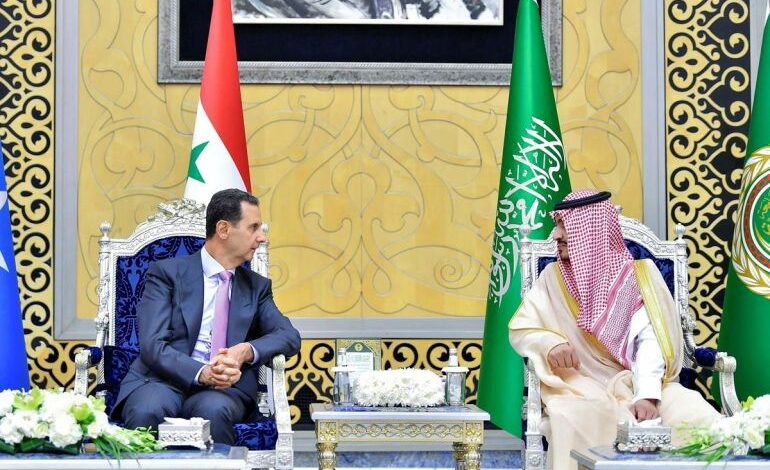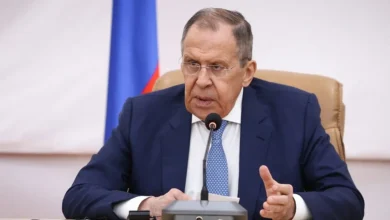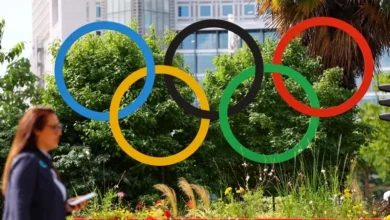Analysis: How important is Syria’s return to the Arab League?

Syria’s return to the Arab League, with the attendance of President Bashar al-Assad at Friday’s summit in Saudi Arabia, will mainly be about symbolism. However, it reflects an important shift in how regional actors view the reality of the survival of al-Assad’s government, in ways that are at odds with the West.
More than 11 years after Syria was suspended from the pan-Arab institution in the wake of the brutal crackdown on opposition protesters and the ensuing war in the country, the emerging consensus in Arab capitals today, rightly or wrongly, is that addressing Syria’s problems requires engagement with Damascus.Understanding Syria’s crisis as an Arab problem, Arab states are determined to pursue Arab strategies for overcoming the toxic and destabilising impacts of this conflict on the region. According to analysts, they hope that by mitigating the conflict, they can begin to reverse the associated drug trafficking networks, refugee crises, weakened border security, and intensified role of Iranian forces and Tehran-backed militias in Syria.
Regaining full-fledged membership in the Arab League marks a major win for Syria’s government, according to Aron Lund, a fellow at Century International and a Middle East analyst.
“Being allowed back shows that Syria is being reintegrated into the region, and that other Arab leaders are confident that Assad is here to stay. So, it is a political victory for the Damascus government,” Lund told Al Jazeera. “In and of itself, it brings very little concrete change. Syria desperately needs aid and investments. The Arab League can’t deliver any of that, but there are Gulf Arab states that can.”
Saudi Arabia as a regional heavyweight
A watershed in Syria’s reintegration into the Arab world’s diplomatic fold came earlier this year when Saudi Arabia began moving towards reconciliation with Damascus.Saudi Arabia as a regional heavyweight
A watershed in Syria’s reintegration into the Arab world’s diplomatic fold came earlier this year when Saudi Arabia began moving towards reconciliation with Damascus.Syria’s government needs financial support and legitimacy – both of which Damascus believes could, at least eventually, come through a reopening of formal relations with Saudi Arabia and other wealthy Arab nations.
“[Al-]Assad is very pragmatic, and he takes the money from where it comes from,” said Andreas Krieg, an associate professor at the Defence Studies Department of King’s College London, in an interview with Al Jazeera. “It doesn’t matter whether it’s from the Saudis, Iranians or Russians. In this context, the regime will do whatever is in its own interests. We’ve seen them being very confident in the way that they engage other Arab countries, especially Egypt, saying we will do whatever is in the interest of Syria and we’re not making any major concessions.”
In the short term, Arab money will probably not begin immediately flowing into Syria simply because of the al-Assad government’s return to the Arab League.
Western-imposed sanctions on Syria, especially Washington’s Caesar Act, are currently the biggest obstacle to investments being made by Saudi Arabia, the UAE and other Arab countries.
Experts agree that without Gulf Cooperation Council (GCC) members being able to invest in Syria it will be difficult to imagine Damascus distancing itself from Iran.“If investments can’t be made into Syria outside of the narrow scope of humanitarian assistance, and if the sanctions stay in place without any waivers, as it is at the moment, there’s no way that either the UAE or Saudi Arabia will put money into Syria and thereby provide the [al-]Assad regime with any incentive to wean off either the Russians or Iranians,” explained Krieg. “Likewise, why would they stop the Captagon trade if they are now losing a couple of billion dollars every year from that drug trade and that loss can’t be offset by money from the Gulf?”
However, analysts believe that Abu Dhabi and Riyadh see the Caesar sanctions as a temporary obstacle that Washington will either lift or ease – even if not necessarily any time soon, with the Emiratis and Saudis assuming that there will come a point when they can begin putting money into post-conflict Syria and leveraging their networks to gain greater geopolitical clout in the country.










